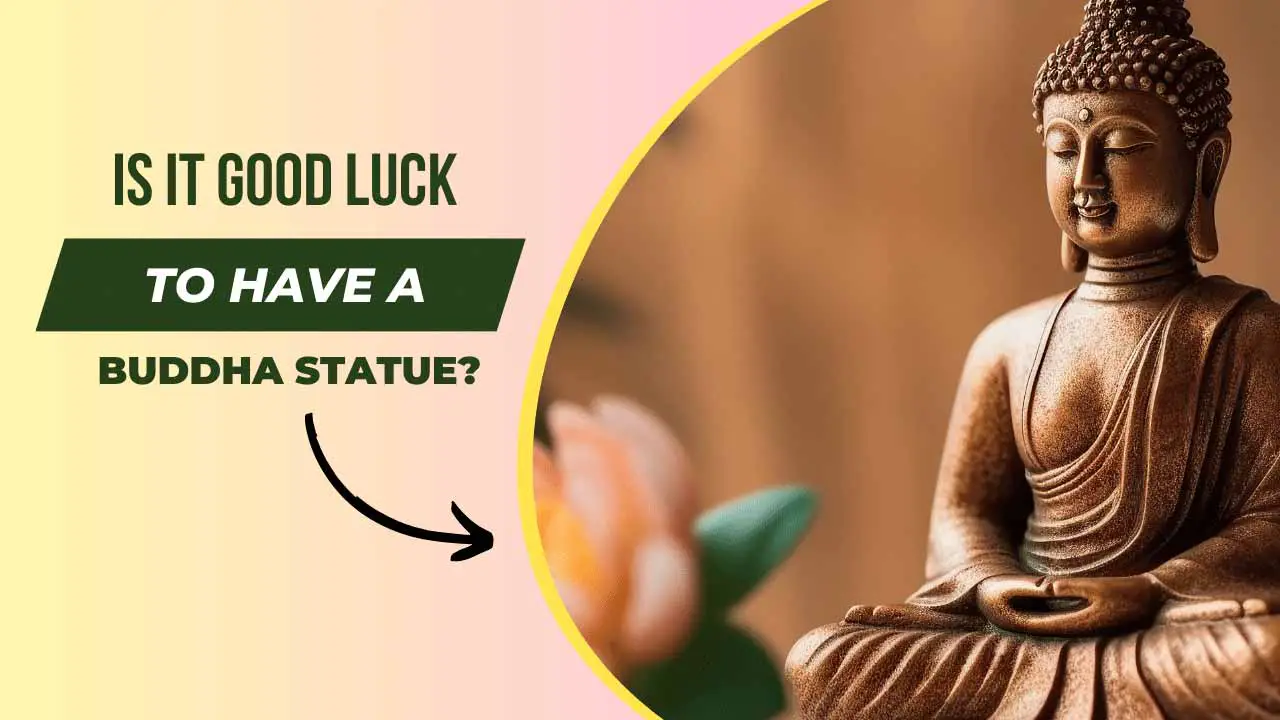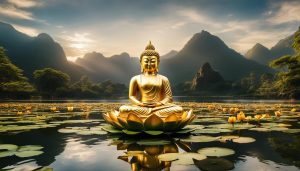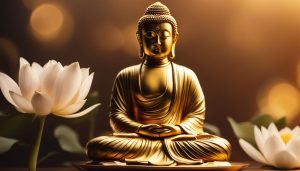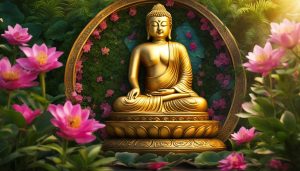A symbol of tranquility, peace, wisdom, and prosperity, Buddha statues have graced homes, gardens, and public spaces for centuries. These spiritual artifacts represent various aspects of the life and teachings of Gautama Buddha, the founder of Buddhism.
Often, people believe a Buddha statue in the home can invite an abundance of positivity, happiness, and good luck.
This article aims to delve deep into the symbolism of Buddha statues, their potential for bringing good luck, and the best practices for placing them in your home.
Contents
- 1 The Symbolism Behind Buddha Statues
- 2 How to Use Buddha Statues to Usher in Good Luck:
- 3 The Different Types of Buddha Statues:
- 4 Guidelines for Placing Buddha Statues
- 5 Conclusion:
- 6 FAQs
- 6.1 Do Buddha statues work as good luck charms in every culture?
- 6.2 Can I buy a Buddha statue for myself, or should it be gifted to me?
- 6.3 Can I place a Buddha statue outdoors?
- 6.4 Does the direction the Buddha statue is facing matter for good luck?
- 6.5 How often should I clean my Buddha statue for good luck?
The Symbolism Behind Buddha Statues
Each Buddha statue tells a unique story, resonating with a specific symbolism through its pose and material.
A complex tapestry of cultural, spiritual, and aesthetic values intertwines these statues, transforming them into more than mere decorative pieces.
The Different Poses of Buddha Statues:
Buddha statues portray various poses, each revealing a distinct aspect of Buddha’s life and teachings.
For instance, the Laughing Buddha or Budai, typically performed with an ample belly and cheerful smile, invites good luck, wealth, and joyful energy into a space.
The Meditating Buddha, depicted in a serene state of deep meditation, symbolizes peace, spiritual awakening, and enlightenment.
The Buddha with the begging bowl, a symbol of Buddha’s compassionate journey, encourages the values of kindness and generosity.
Also read: Is it Good Luck Receiving a Buddha Statue as a Gift?
The Materials of the Buddha Statue and Their Meanings:
The materials used in crafting Buddha statues add another layer to their symbolic depth. Gold and silver statues often stand for wealth and abundance, amplifying the statue’s auspicious implications.
On the other hand, sculptures made of wood or stone, due to their natural and earthy essence, are associated with grounding energy, stability, peace, and tranquility.
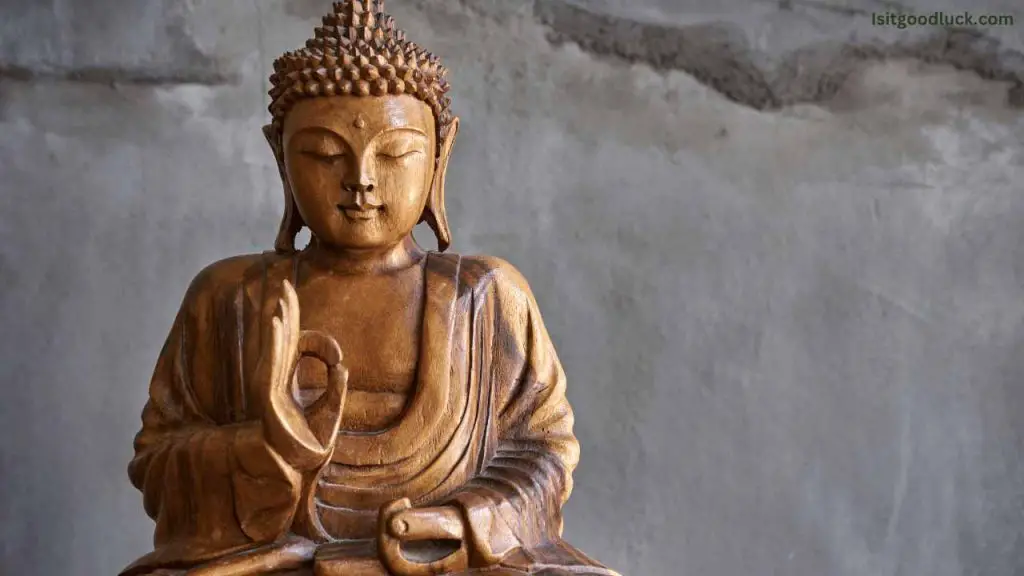
How to Use Buddha Statues to Usher in Good Luck:
Buddha statues can become powerful conduits of positive energy and good luck when placed with intention and respect. Here are some ways you can harness this potential:
1. Invoking Positive Energy
Positioning a Buddha statue in a prominent spot within your living space can instill a harmonious and uplifting ambiance. The mere presence of the Buddha’s peaceful countenance can have a calming and positive impact on the environment.
2. Setting Intentions and Manifesting Desires
Buddha statues can serve as focal points for setting your intentions and manifesting your desires. For instance, placing a Buddha statue in the southeast corner of your home, known as the Feng Shui wealth corner, can help invite prosperity.
3. Meditating with Buddha Statues
Meditating in the presence of a Buddha statue can deepen your spiritual practice, connecting you with Buddha’s wisdom and compassion. This alignment can facilitate overcoming obstacles, fulfilling your aspirations, and fostering a joyful and meaningful life.
The Different Types of Buddha Statues:
There is a myriad of Buddha statues available, each embodying unique symbolism. Some of the most popular ones include:
- The Laughing Buddha: The Laughing Buddha is Universally loved and believed to usher in prosperity and good luck.
- The Meditating Buddha: Symbolizing peace and enlightenment, it is an ideal choice for meditation spaces.
- The Buddha with the Begging Bowl: Representing compassion and generosity, this statue inspires us to cultivate these virtues.
- The Buddha with the Lotus Flower: Symbolizing purity and spiritual awakening, this statue is famous among those seeking spiritual growth.
Guidelines for Placing Buddha Statues
The placement of a Buddha statue can significantly influence its efficacy. Here are some general recommendations:
- Ensure the Buddha statues are visible and appreciated, reinforcing their positive influence.
- Avoid positioning Buddha statues in areas associated with negativity, such as the bathroom or laundry room.
- If you intend to use a Buddha statue to manifest specific desires, place it in your home’s appropriate Feng Shui zone.
Conclusion:
Buddha statues are potent symbols of good luck, happiness, and positivity. Understanding their intricate symbolism and mindful placement can enhance their auspicious energy, transforming your space into a haven of peace, prosperity, and well-being.
Also read other articles regarding Buddha’s good luck
FAQs
Do Buddha statues work as good luck charms in every culture?
Buddha statues are most prominently associated with Buddhist and certain Asian cultures where Buddhism has had a significant influence. The belief that they bring good luck primarily originates from these cultures and Feng Shui practices.
Can I buy a Buddha statue for myself, or should it be gifted to me?
Either way is acceptable. While some cultures believe that a Buddha statue brings more luck if received as a gift, this is not a universally held belief. The important thing is that the figure is chosen or given with good intentions and is treated with respect.
Can I place a Buddha statue outdoors?
Yes, you can place a Buddha statue outdoors, such as in a garden, provided it’s made from a material that can withstand weather conditions. It’s also crucial to ensure it’s placed respectfully, preferably at eye level or higher, and not on the ground.
Does the direction the Buddha statue is facing matter for good luck?
In Feng Shui, direction can play a role in how energy flows. However, there are no strict rules about which direction a Buddha statue should face for good luck. That said, many people prefer to have the figure facing into the room or the front door rather than towards a wall or the back door.
How often should I clean my Buddha statue for good luck?
There are no specific rules about how often you should clean your Buddha statue. However, maintaining your bust—clean and dust-free—is considered a form of respect, which can positively influence the energy the figure brings into your space.

